Investors are still pondering Goldman Sachs' (NYSE: GS) sale this week of its remaining stake in Chinese banking giant ICBC (
1398.HK; NYSE: 601398), trying to figure out if the move is a positive or negative for China's wobbly banking sector. My view is that the move is indeed positive, which is being supported by the latest word that a big portion of Goldman's stake was purchased by Temasek, the massive Singaporean sovereign wealth fund.
Before we go any further, it's worth repeating what I've said before about the buying spree by western banks in their Chinese counterparts that took place about a decade ago. That spree saw Goldman, along with other major names including Bank of America (NYSE: BAC), HSBC (
0005.HK; London: HSBA) and Citigroup (NYSE: C), all buy major stakes in Chinese lenders as many of those banks cleaned up their books and ultimately went public.
Most of the western banks saw their investments not only as financial plays, but also as a chance to find strong local partners to help them tap the huge China banking market that was starting to open up to foreign investment. But in the years that followed, most of these big western players found they had little in common with their Chinese partners, most of which were massive state-run lenders that still took their orders from Beijing.
The failure to get any strategic advantage from the partnerships, combined with a sudden need for cash after the financial crisis of 2008, thus led many of the major western banks to dump their shares over the last three to four years. Goldman is the latest to join that trend,
selling its remaining shares in ICBC earlier this week for US$1.1 billion. The sale completed an official divorce between the two sides, which had been happening over the last three years as Goldman gradually sold down its ICBC stake purchased in 2006.
While Goldman has expressed its clear lack of interest in Chinese banks for now, the opposite is true for Temasek, which
picked up about 280 million ICBC shares from Goldman sale, according to a Chinese media report. Temasek also purchased another larger chunk of ICBC shares that Goldman sold about a year ago, meaning the Singaporean wealth fund now holds about 7 per cent of ICBC shares, according to the report.
This changeover from Goldman to Temasek looks like a good sign to me, as it shows that ICBC is still attractive as a pure investment play to foreign institutional buyers, even if it looks unattractive to foreign banks. Personally speaking, I would never consider any of China's big four state-run lenders as a good strategic investment partner, since all are still closely associated with the central government.

